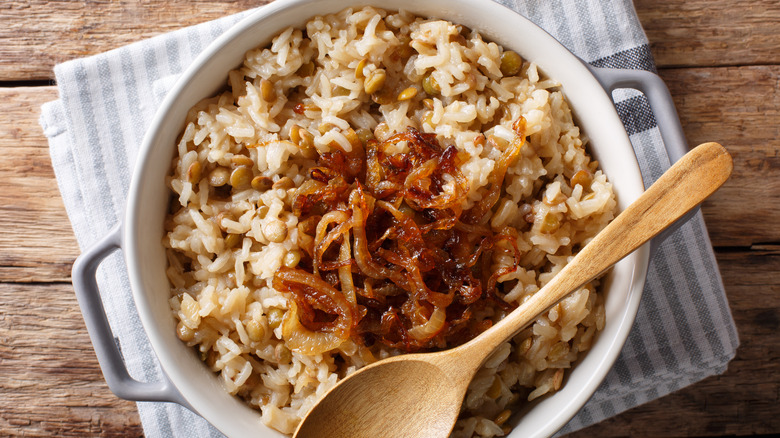Is Rice Kosher For Passover?
Many Jews will tell you that Judaism isn't just a religion, but also a way of life. It follows, then, that Jewish laws encompass every aspect of life, including diet. There are many everyday kosher dietary laws that both Reform and even Conservative Jews no longer observe. However, most denominations adhere to kosher laws over the eight days of Passover, a springtime holiday honoring Jewish freedom from slavery as told in the First Testament book of Exodus.
In symbolic reverence to the ancient Jews' 40-year trek across the desert out of Egypt, Passover requires observers to eliminate all grains that can be leavened and made into bread from their diet for eight days. This typically includes wheat, barley, oats, rye, and farro. While rice doesn't fall in this category, Ashkenazi Jewish law also forbade its consumption during Passover. Jews fall under two geographical designations; Ashkenazic Jews reside in or have Western and Eastern European roots while Sephardic Jews come from southern Europe, North Africa, and the Middle East.
Rice, along with all types of beans, millet, and corn, falls under the dietary category known as kitniyot, which Ashkenazic Jews have likewise prohibited during Passover. They argue that kitniyot has many of the same properties and preparation methods as leavened grains and can be fermented and turned into flour for bread. Sephardic Jews, however, disagree with the Ashkenazic argument and consume rice and other kitniyot during Passover. Therefore, whether or not rice is kosher for Passover depends on both geography and lineage.
A reversal of dietary law 800 years in the making
The prohibition of rice and kitniyot dates back to 13th century France and has been a controversial choice from the start. Documents from the 13th century chronicle the debate and dissension of over 50 different rabbis and Jewish sages who argued that the prohibition of kitniyot wasn't backed by Talmudic teachings. Beyond interpretive arguments, dissenting Jews throughout history have also claimed that the practice is too limiting during times of scarcity.
Issues of scarcity persist at present, changing from agricultural to economic scarcity as global inflation has increased the cost of kosher foods. Rice remains a cheap staple that will provide lower-income Jews sustenance while abstaining from bread and pasta. In 2015, the economic argument ended up convincing the conservative movement's Committee on Jewish Law and Standards to officially permit the consumption of kitniyot during Passover.
Nevertheless, there's a large population of Ashkenazic, Conservative, and Orthodox Jews holding onto the 800-year-old tradition. Their underlying argument is that now, more than ever before, it's much easier to create bread and even pasta out of rice, beans, and corn. So, this loophole defeats the purpose of the symbolism inherent in the Passover laws, and in turn, obscures the lesson and story the holiday commemorates. No matter which side of the argument you're on, there are plenty of delicious Passover recipes to satisfy both camps.

